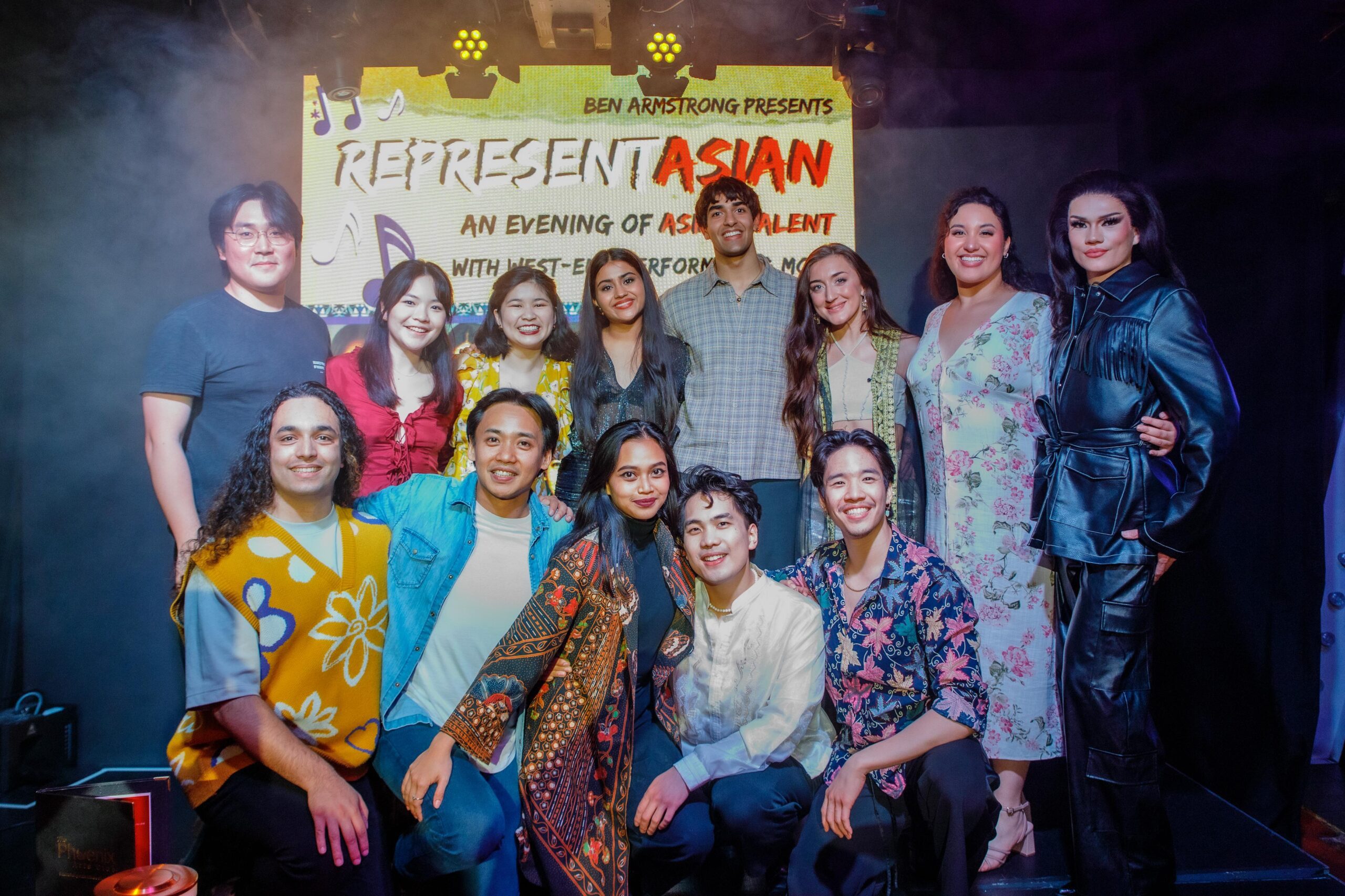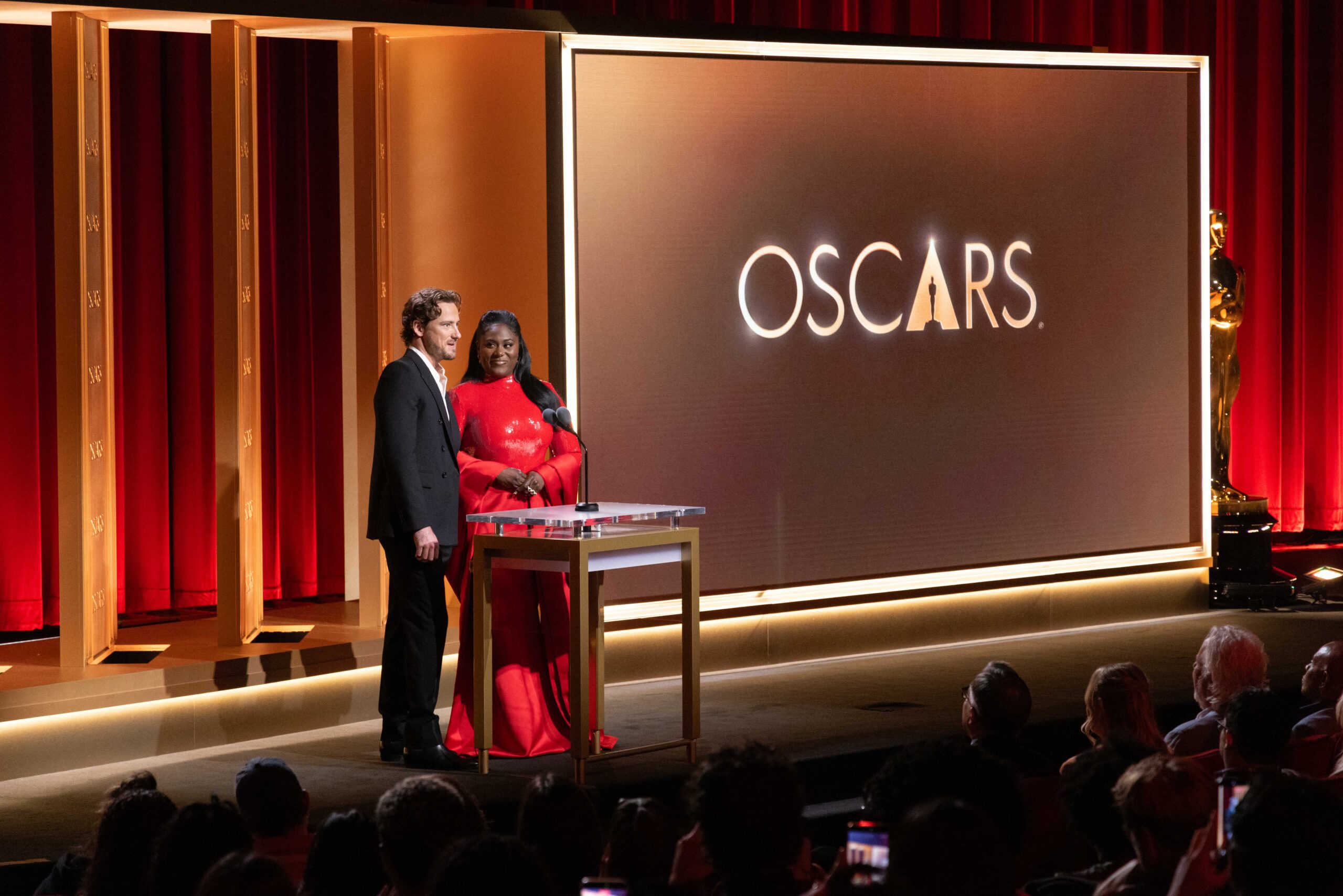RepresentAsian’s Ben Armstrong and Aixa Amarante Naranjo reveal how passion drives their mission to champion Asian talent and create lasting change for diversity in theatre.
In an industry where meaningful representation remains a challenge, the story of RepresentAsian shows what happens when a community comes together to give a platform to performers and creatives who may not have had the opportunity to be seen.
Born from a simple social media call-out in 2021 by founder and casting director Ben Armstrong, RepresentAsian has quickly evolved from a successful fringe concert series into a powerful movement dedicated to addressing the lack of Asian representation and diversity in theatre. Now co-led by producer Aixa Amarante Naranjo, who champions a duty of care for performers, the initiative uses passion to drive its mission of celebrating Asian talent.
We are proud to be sponsors of RepresentAsian, which brought its 2025 gala concert and fundraiser, hosted by Nina Wadia, to the Lyric Theatre in London’s West End on Monday 13 October. The night featured a fabulous line-up of Asian artists – including Conrad Ricamora, Joanna Ampil, Frances Mayli McCann, El Haq Latief, and Desmonda Cathabel, among many others – with proceeds supporting The Boury Academy to fund scholarships for young Asian performers.
We sat down with Ben Armstrong and Aixa Amarante Naranjo to find out more.
In this interview, you’ll learn:
- How RepresentAsian came to be and how it’s championing Asian talent
- How creating community can lead to career-defining opportunities.
- The significance of establishing a scholarship that addresses financial and practical barriers for artists.
- The behind-the-scenes challenges of launching a grassroots West End event.
- Actionable ways to use your own background to challenge industry stereotypes.
Hi, Ben and Aixa! What’s your background in the performing arts?
Ben Armstrong: I graduated from Chichester in 2019 and then I did my master’s at the Royal Academy of Music in 2021. I acted for a few years and I was very grateful with the work that I did and it’s the reason why I’ve now gone into casting. The work with RepresentAsian and the concerts, and what we’re trying to achieve, all aligned with my trajectory in my career. All of the work that I do in casting is always through a lens of ‘how can I make sure that the company I assemble is diverse and inclusive and representative of the world I see’. That’s a bit of me.
Aixa Amarante Naranjo: I trained in musical theatre. And I went into stage management because I’ve always been one to question the system and not necessarily agree with how things were being run or how decisions were made. As soon as I found out what producing was when I was younger, I was like, I think that’s what it is, so I did my MA in Creative Producing at Central School of Speech and Drama.
For me, specifically, it was when In the Heights came out because I’m half Spanish, half Dominican, my dad is from Washington Heights. To see my dad see himself in In the Heights was like, yes, I want to be a producer. Having people see themselves represented is my purpose, facilitating that and advocating and championing for diversity and also a duty of care that may not have been afforded to people of colour. I’ve seen my own impact at the forefront in these producing rooms where it’s like, I wonder what it would look like if I had not been here? It’s kind of like mama bear nurturing. I’m going to protect the people to make sure that they’re taken care of and their stories are told and they’re told kindly without having a tokenistic aspect of it.
How did the idea for RepresentAsian come about?
Ben Armstrong: I put a call out on X, or Twitter when it was known as that, just saying, “Hey, theatre community, if you’re in the Asian community, please reach out. I want to do something.” I didn’t know what it was. I was inundated with over 3,000 responses and I went, “My gosh, people are craving a platform.”
When I decided that I was going to do a concert, I was trying to think of what encapsulates what I want to do, that’s representing and who I’m doing it for. Quite quickly, I thought, ‘RepresentAsian’, because my auntie Maria sometimes pronounces it like that. And I could just hear her voice in the back of my head and I went, “Oh, RepresentAsian, that sounds quite fun.”
I did think that it was a bit too cheesy when I first did the concert. But then I think after the third one, a couple of industry professionals that I was working with at the time said, “This name is great.” And I went, “Yeah, it is actually,” because without knowing what the show is about, you see that one title and you know that it’s about representing the arts and it’s about the Asian community. And then it just stuck.
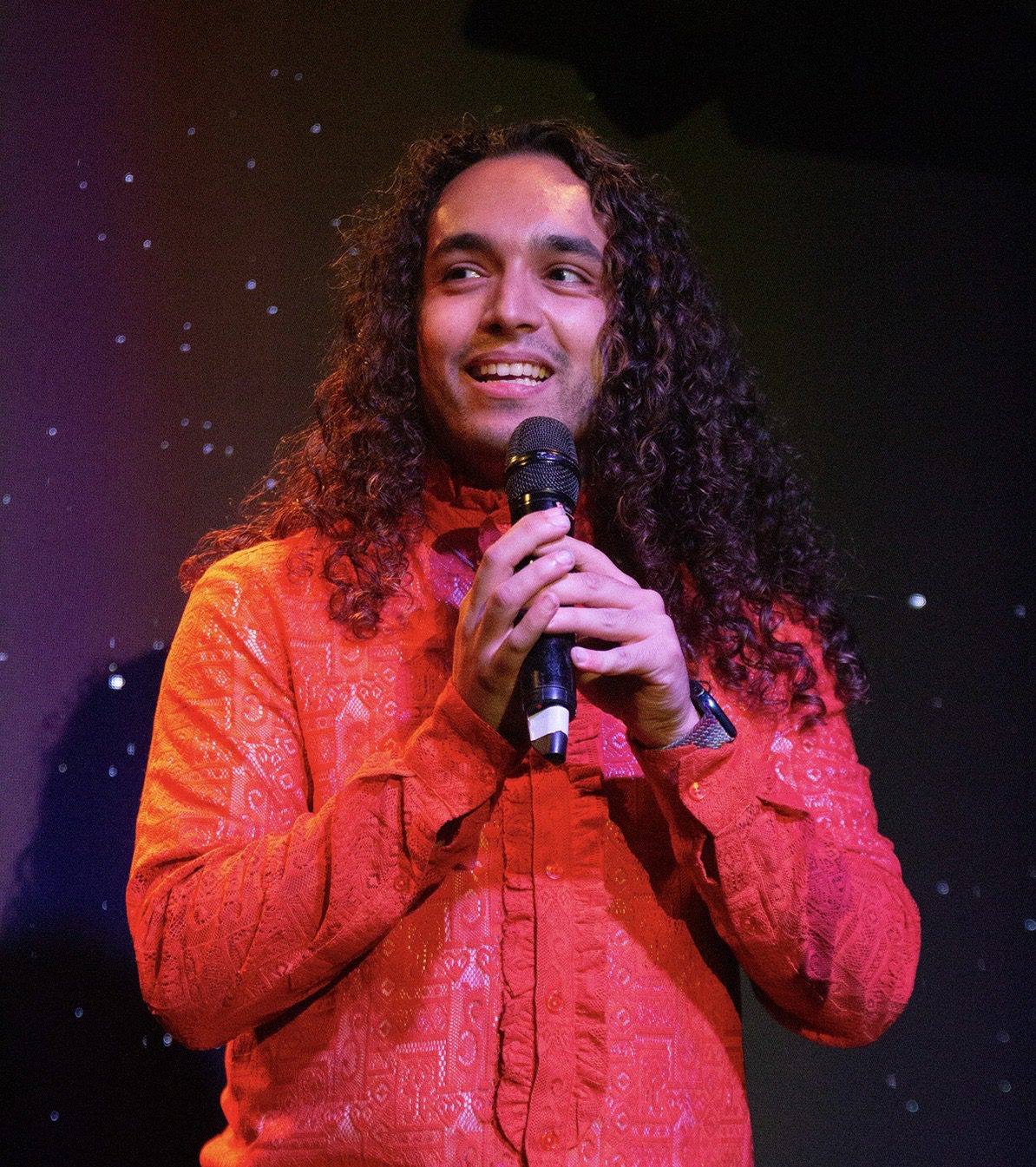
Image credit: Eli King / Ben Armstrong
The name, RepresentAsian, is genius!
Ben Armstrong: You know what? It’s so funny because in my day-to-day life, I now add ‘Asian’ onto words that end in ‘ation’. The other day, someone told me some good news and I said, “CongratulAsians.”
Aixa Amarante Naranjo: That’s the best kind of marketing.
What steps did you take to make the event a reality?
Ben Armstrong: I was working as a bartender, as many of us often do, at the Phoenix Arts Club (in London), and it’s a great fringe venue. I love the Phoenix and they put on different shows all the time: cabaret, magic, musical theatre, individual showcases. And I said to my boss, “Hey, do you think I could do a night here?” And he was like, “Yeah, sure. Do whatever you want.” We did the first show and it was a roaring success!
Annoyingly, I wasn’t actually there for the first one because I had Covid. I was on a Zoom screen on the back, so I wasn’t actually there to feel the atmosphere, but I thought, “This venue is packed and the audience reflects the people on stage.” That’s the thing that I was inspired by the most, that this show brought in an audience of varied colours, and it was beautiful to see through a screen.
Peter, my boss at the time, said, “Hey, when can we get RepresentAsian back in?” and it just kept happening and happening. The fact that people had a demand for it, reinforced this idea of why Aixa and I needed to do this West End concert, because people want it and they need it. If we can keep doing this and reaching more and more people, I really do think that we’re going to make a difference and that excites me deeply.
When did you join the team, Aixa?
Aixa Amarante Naranjo: As soon as Ben posted that he wanted to do it on a larger scale. I think it’s been such a great opportunity for my debut West End credit to be in something I’m so passionate about. I’m Hispanic, so obviously it’s not my community, but it’s a similar fire, and that’s where the humanity comes in. I’ll never understand what it’s like to be an Asian person in the performing arts, but I understand what it’s like to not feel seen and have these very harmful stereotypes, to grow up with that and see how it’s affected me and my family.
I can now use my knowledge and my own experience to take the lead on something so beautiful. I thank Ben almost at least once a week for the opportunity of trusting me. Commercial production is so money-led, “Money makes the world go around,” as Cabaret says, but there is a world where passion can lead and money can be secondary and I think [RepresentAsian] has proved that because it’s so successful.
Ben Armstrong: The team that we’ve assembled encapsulates that so well because for the first six RepresentAsians, I did it all myself with the help of my trusted MDs [Musical Directors] who did each respective one. Coming on board to do a West End gala night, I went, “This can’t be done by one person alone.” I’d worked with Alex Kais (House of Kais Ltd), who’s our Head of Brands and Partnerships, before, and our amazing MD, Amy Hsu, who’s done a couple of my other RepresentAsians. It’s these individuals who all share the same goal. You put them together and you go, “Are we going to work? Are we all going to understand?”
There’s been no moment of conflict or ego and I think that’s because, as Aixa said, passion leads these processes. We all believe in the same thing and we all know to work together to make it happen. Representation and diversity is not a new thing, people have been preaching about this for centuries. We’re a small cog in this mechanism of going, let’s just try this and let’s make it better. I’m excited to see what happens next Monday at The Lyric.
How has the mission evolved from those initial six sell-out events at the Phoenix Club to the Lyric in London’s West End?
Ben Armstrong: We set RepresentAsian up in 2021. It was from an urge to do something. I didn’t know what it was, but I knew that something needed to be done. As soon as the first one happened and it sold out and it was such a huge success, it made me realise that this is very important and necessary. And we continued to do them as small concerts.
And I just thought to myself, ‘How can we make this reach more people? Because it feels like our inner circle of the Asian community were very much on board with what we stand for, but how can we reach it further and really get this message across?’ And I thought, what better stage than the West End stage? So, I reached out to Laurence from Nimax and pitched him the idea and instantly he said, “Yes, we need to get this on. We need to make it happen.”
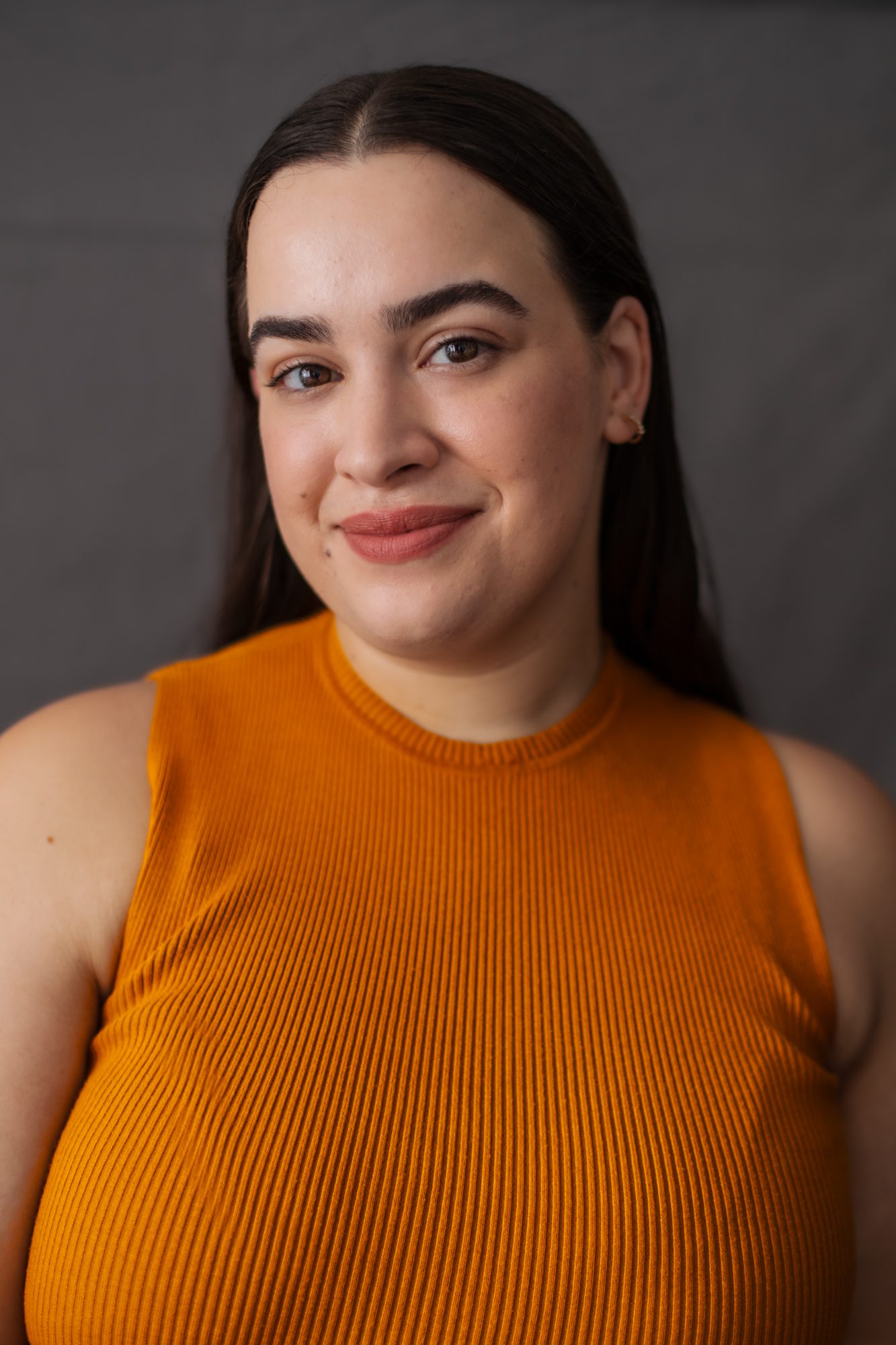
Image credit: Marshall Stay / Aixa Amaranta Naranjo
What’s the significance of RepresentAsian being supported by Nimax theatres?
Aixa Amarante Naranjo: It’s a huge vote of confidence and encouragement because oftentimes as creatives, producers and cast of colour and of global majority, it’s so easy to be discouraged. So to have the big players sort of pat us on the back and say, “We believe in you and we believe in this,” is massive.
Ben Armstrong: Nica Burns celebrated 20 years, I think, this year with Nimax and she’s been an absolute pioneer for championing diversity and stories that haven’t been told otherwise. To have her support really means the world.
What unique challenges and opportunities have arisen from producing this one night only concert on the scale of the West End?
Aixa Amarante Naranjo: I think having competition like The Phantom of the Opera and Les Misérables, who have 30 years of marketing, is quite daunting. We’re not a known name, unless you’re part of the community. So I think finding our own little corner of the sky where we can say, “Hey, we’re here.” So many people have approached us wanting to be a part of it and I think that’s the best marketing in the world.
Ben Armstrong: In terms of opportunity, there are so many Asian performers and creatives out there and some of them haven’t had the opportunity to really be seen as themselves for whatever reason. No matter if [RepresentAsian] has an outreach of 100 people or a million people, the thing that we’re proud of is what we’re creating is really championing and uplifting every type of voice within our community. I’m really proud of that. We’re supporting and nurturing talent from grassroots to people who have been doing it for 30 years and that’s something special that we’re holding on to.
You’ve got established performers like Nina Wadia involved. How do you balance showcasing well-known performers with introducing new talent?
Ben Armstrong: I think what’s really incredible is, at the end of the day, we’re all human beings who want to put our work out there. Nina Wadia, who’s been doing this for a long time, as soon as I approached her and said, “This is our thing. Would you like to come on board?” Without hesitation, it was a yes. I think there’s something to be said about the camaraderie within our community and the outer community. Our RepresentAsian team, cast creators and crew are not all Asian. We are predominantly Asian, but we have people from other underrepresented groups who care so much about diversity and representation. With the ethos that we have of championing and uplifting voices, that one idea, so many people want to get on board no matter what your experience is.
The event is a scholarship fundraiser for Asian artists. Why did you choose the Boury Academy as your partner for this initiative?
Ben Armstrong: Rakesh Boury, who founded Boury Academy with his wife Caroline, has been a friend of mine for a while, and he’s also a RepresentAsian alumnus. He told me about this school and when I was thinking, we need to create a scholarship for young Asian kids, but where do they train and who is supporting them? We looked around at a lot of different places and the Boury Academy has core values of diversity, representation and inclusivity.
The teachers that they bring in reflect the world. The training that they do reflects the world and the intake they have reflects the world. And I wanted to make sure that whoever receives this scholarship is in a space where their identity and authenticity are celebrated and it’s not a gimmick and that won’t happen at the Boury Academy. I just think the work they do is incredible and I couldn’t think of a better brand to invest our scholarship into.
Can you tell us more about the scholarship and how it will help recipients?
Ben Armstrong: What we aim to achieve with this is not just to provide training, but provide the equipment, clothing, travel, opportunities to have workshops with theatre professionals. Spotlight is granting a year’s free membership to the scholar, which is incredible. We’ve also got other sponsors who will be offering additional support and perks. I think that’s an amazing thing because we wanted to go, if you’re young Asian and you want to do this, there shouldn’t be any barriers that you have to face whether it’s financial, whether it’s about where you are in your life, your age and your circumstance. This scholarship, hopefully, will eliminate as many of those barriers as possible and just support the training.
All of us are so passionate about it and everyone involved in [RepresentAsian] have really invested a lot of time and energy into this and we hope that it’s not going to be a one-time thing. We want to make sure that we can provide these scholarships for a long time and build a legacy.
What response do you hope the audience is going to take away from the evening?
Ben Armstrong: First of all, the show is celebrating and uplifting the Asian community. This show is not just for Asian people. What we’re celebrating is humanity and equality and making sure that us in the Asian community are on the same level playing field as everyone else. And what I hope that the audience takes away from the show is they have a really fun night, they witness great talent and great performances, and they realise that there is still work to be done and it’s all well and good talking about it, but it’s the action that you take.
What we’re doing, the action that we’re taking, is providing entertainment and raising money to enrich grassroot talent. And I hope that people leave the theatre going, “What could I do to make things better? Is that to educate myself? Is that to go to more theatre that’s not just commercial and support fringe? Or is that to tell people what an amazing time they had and how important it is to acknowledge when casting perhaps is black and white and why that could be better?”
I just want people to keep thinking about this and all of the audiences are doing a great thing because the money that they paid for their ticket goes towards the scholarship and supporting and enriching young Asian talents. They’ve already done some of the work, but the work doesn’t stop here. We can keep going.
Find out more about RepresentAsian.
Final Thoughts:
The experiences shared by Ben Armstrong and Aixa Amarante Naranjo highlight that carving out a meaningful career in the performing arts requires more than just talent; it demands agency, community and purpose. Here are some actionable steps inspired by their journey:
- Find your community and platform: Don’t wait for established institutions. If you see a gap in representation, like Ben did with his initial call-out, create your own platform. Community reinforces purpose and makes you feel seen.
- Passion matters: Let your passion for the art and for authentic representation be your primary motivator. When passion leads, Ben notes that conflict and ego are minimised, creating a better working environment.
- Advocate for duty of care: As Aixa demonstrates, your role is not just on stage. Use your voice to question the system and ensure a duty of care for all, helping to move the industry past harmful stereotypes and tokenism.
- Network with shared ethos: When building a team or joining a project, seek out people who share your core values, regardless of their background. The RepresentAsian team thrives because everyone believes in the mission of diversity and inclusion.
Understand the bigger purpose: Recognise that your performance can serve a role beyond entertainment. Being part of a movement can clarify why you are performing and elevate your work.
